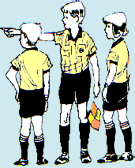
One of the greatest frustrations for newly licensed referees is that they are not able to differentiate between what they are doing well versus what needs to be improved. Absent that skill(differentiation) the door is left wide open to underperformance...until someone provides feedback, such as the pivotal service provided by Mentors. Once it is provided, new referee self-development is no longer delayed and is certainly less confusing.
New referees are usually eager to know how they are doing and want to know that they've gotten better in key areas like: Positioning, Movement, Communication, Signaling.
Those of us in the ‘advice business’ and teachers in general know that reinforcing new skills is the better place to begin than starting with things to change(which is often viewed as criticism). So, we want to LEAD WITH THE COMPLIMENT, identifying 1-2-3 skills that are being applied well and start there. The value in doing this is that it develops their ability to differentiate between what is going well from what to work on, a critical self evaluation skill.
Of course it almost always feels good to get a compliment....but a compliment also does something else: it gets their attention and predisposes them to listen to what you'll say next. If you are applying this teaching technique with another official present, the other AR or CR, you are reinforcing/teaching desired skill(s) for that official to follow as well.
There’s one ‘rule’ when Leading With The Compliment, it needs to be genuine and customized. This should not be a concern for Mentors who rely on their ability to NOTICE a Mentee during the match. By the nature of what we do, we ought to be noticing what is being done well too, saving those ‘snapshots’ for the ½ time break or end of game comments.
Pace yourself when giving a compliment....Before rushing into what they need to work on, give them a chance to enjoy what you said about them. It takes discipline to hold back from the normal inclination to jump right into corrective commentary. Younger new referees are used to getting corrective commentary as the first line of approach from their parents. When a Mentor breaks with that tradition, Leads With The Compliment, they become someone with whom new referees want to listen to for their advice.
Here's an example of how it works:
"Alicia, your positioning with the 2nd to last defender was totally on target. They didn't have an inch to spare. Players were continually looking over to see if you were watching.... Don't change a thing. That was just right!"...and, PAUSE(silence)...this is where you let Alicia enjoy what you said. She's undoubtedly smiling from ear to ear. What you just said reinforced a critical POSITIONING skill which we want her to continue doing. Having heard this, she knows that she is on target as a developing new official, and, is better able to differentiate that newborn skill from other performance areas. Complimenting her with another official present...reinforces developing that officiating skill for that listener too. It also builds confidence.
Turning to the other official, you might say, "Ben, your signals and flag work were crisp, clear, not rushed, not too slow. Everyone knew exactly what you were signaling. Players gained confidence in your calls AND you made great eye contact with me. That's the way to do it." (AND PAUSE...)
Now Ben’s beaming from ear to ear... while Alicia listens. Again, we use the compliment as a teaching tool that helps new refs differentiate between what they are doing well and what to work on. To be effective it needs to be GENUINE / CUSTOMIZED. We don’t want to make something up, we’ll immediately lose credibility doing that. Again, just as with Alicia, the brief PAUSE(silence) can be as perfect for the situation as a ‘non call’ is during the game.
A PAUSE could include silence, or getting some water, checking voice mail, saying hello to a friend or parent on the touchline, etc. If a Mentor has something to say about their officiating, the time to make corrective comments is after the PAUSE
Mentors need to trust that new referees are counting on the objective feedback of the Mentor. During the Licensing Class, referees-to-be should become aware of the Mentoring Program and how it mentors referees. At the field, Mentors will tactfully demonstrate how compliments and corrective comments can successfully co-exist.
Mentors need to trust that use of a compliment isn't a gimmick. It is a legitimate teaching tool, one that helps build a relationship between the sender and receiver(s).
Suppose it really wasn't a good first half on their part: A Mentor might say,"Whew, that was a rough first half, but I felt like we really started to work together as a team......" (They probably know how badly things went and are feeling pretty awkward about it...) You can leave them with something that pulls them back into the 2’nd half, something that let’s them know that working together as a team is very important in our work. Even if you only saw the eye contact once, reinforce that. In fact, that could be the entry point for corrective commentary/advice... “let’s see more of the great eye contact in the 2’nd half....” Then at the end of the game, finish off your time together by reinforcing their strong points...as they say in ‘show business’, “leave ‘em wanting more.”
Finally, they'll associate seeing you at the field with good feelings, even anticipation...and that's a good thing. Had we spent precious mentoring time dwelling only on the negative, new refs would not likely look forward to working with you again---that's not a good thing. Perfecting this coaching technique takes time and practice...it's a worthwhile teaching tool that can, if applied skillfully, help new referees flatten their learning curve, and that's a good thing.
